9+ SAMPLE Timeshare Contract
-
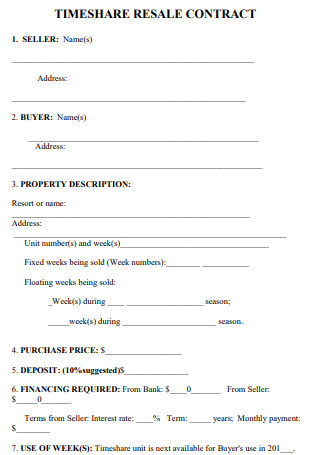
Timeshare Resale Contract
download now -
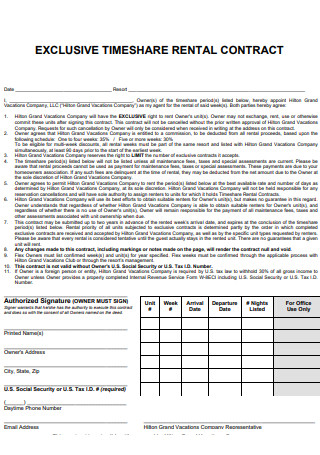
Exclusive Timeshare Rental Contract
download now -
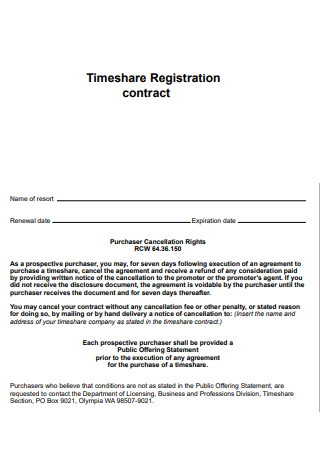
Timeshare Registration Contract
download now -
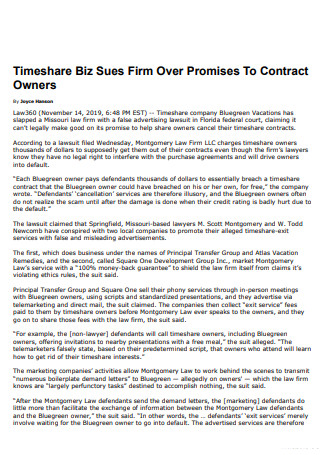
Timeshare Contract Owners
download now -
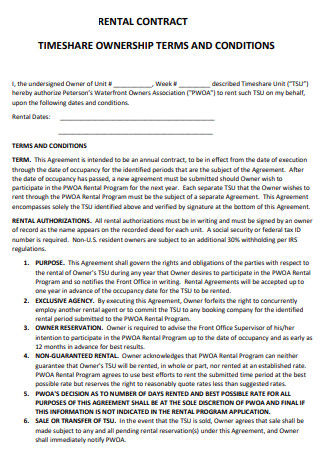
Timeshare Ownership Rental Contract
download now -
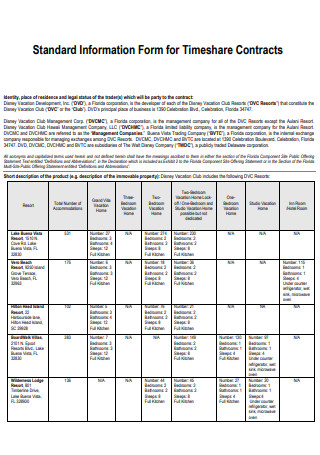
Standard Information Form for Timeshare Contracts
download now -
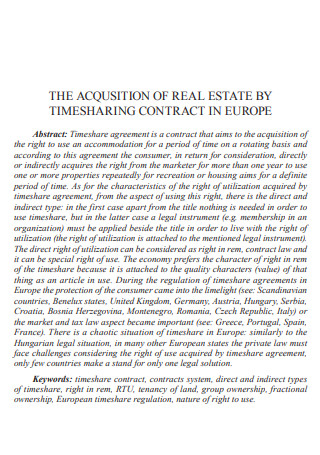
Real Estate Timeshare Contracts
download now -
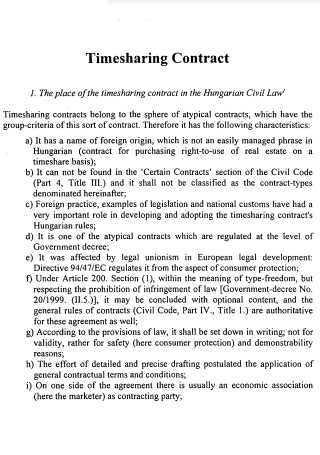
Sample Timeshare Contracts
download now -
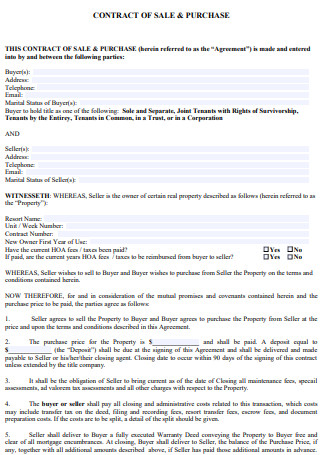
Timeshare Contract Example
download now -
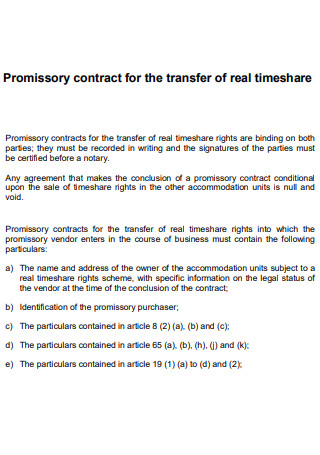
Timeshare Promissory Contract
download now
FREE Timeshare Contract s to Download
9+ SAMPLE Timeshare Contract
What Is a Timeshare Contract?
Factors to Consider When Agreeing to a Timeshare Contract
Different Variations of a Timeshare
Steps in Purchasing a Timeshare
FAQs
Are timeshares for everyone?
I want to get rid of my timeshare without consequences. How do I do it?
Are Timeshares a Great Investment?
What Is a Timeshare Contract?
First of all, what does timeshare mean? Well, it refers to a shared ownership concept of a real estate property, typically used for vacation purposes, in which numerous purchasers possess allotments of usage, often in one-week increments, in the same estate. Units in a timeshare can be purchased as a partial ownership, lease, or “right to use,” in which case the buyer has no claim to the property. These are usually available for different types of real estate properties such as apartments, condominium units, and beach resorts.
A timeshare contract is a legal document that is used to legally bind the timeshare purchaser to pay the seller a set sum each year to own or have the exclusive use of the property on a set date. Buyers that get involved in a timeshare contract will often settle for a short timeframe, typically spanning one to two weeks. The cost of a timeshare contract is determined by the time of year and location of the property. Furthermore, a timeshare contract will also legally bind the buyer to pay the property’s yearly maintenance payments. The cost may be high, but it is shared by the property’s various owners.
Factors to Consider When Agreeing to a Timeshare Contract
Here are a few of the important factors to consider before entering a timeshare contract:
- Duration – More often than not, a timeshare contract can be considered a perpetuity contract. What does a perpetuity contract mean, you ask? Well, it basically means that the duration of the contract lasts forever. So whenever this clause is written in the contract (and it usually is, in the case of a timeshare contract), it means that the party can use said property forever. A majority of perpetuity clauses will end on the signing party’s death, but that is not the case in a timeshare contract. Instead, the responsibilities of that contract get passed on to an immediate family member. This is because the timeshare companies need to pay maintenance fees in order to keep the property operational for as long as possible as well as to pay their staff and taxes.
- Contract Type – This is another factor that you need to consider before entering a timeshare contract. There are different types, and each type can affect how your holidays pan out, along with the satisfaction that comes with it. For one, there is a fixed-week type of timeshare contract. It is only effective for a single real estate property, which can get boring for some people. Another one would be an exchange type of timeshare contract, a type of contract in which a customer joins an exchange program that allows them to access alternative accommodations in exchange for providing the other person temporary access to their timeshare. This has several limits, however, such as the fact that if you have a fixed week contract, you can only switch timeshares with people who have a similar week as you.
- Time of the Year – One more factor to consider prior to entering a timeshare contract is when you are planning to enter the contract and what time of the year you are planning to use the property. In a fixed-week contract, you pay annually for the privilege to use a certain property such as a resort or villa on a given week of the year. But because everything is predetermined, you have limited leeway in changing resorts or weeks, and an exchange program would be needed if you want to do so, which adds further complexity. A floating weeks timeshare contract enables you to access your timeshare at any time of year, depending on availability. While this may appear to be the ideal kind of contract, it is frequently difficult or impossible to secure the weeks you desire due to increasing demand during specific periods of the year.
Different Variations of a Timeshare
Listed and discussed below are some of the different variations of a timeshare:
Steps in Purchasing a Timeshare
As stated throughout this article, having a timeshare can prove to be a great way to secure a property to be used as a vacation place by you and your relatives or friends. You may already have a few thoughts going on in your head as you think about purchasing a timeshare. Once you’ve figured out the place that you want, here are the steps to follow in purchasing a timeshare for that place.
-
1. Pick a Timeshare Type
This is the first thing to do once you’ve chosen a place and you’ve decided that you’ll commit to a timeshare. In this step, choose a timeshare type that suits your preferences or lifestyle. If you decide to own only a part of the property you’ve chosen, a deeded ownership would be the best for you since you only buy a certain time period each year of that particular unit, and upon purchasing the said unit, it makes you a part-owner of that property. If you prefer more flexibility over your property, then the “right-to-use” type of timeshare would fit you best. In this type of timeshare, you can buy a specific time period in a year, or you may buy the right to a certain period of time in a year.
-
2. Pick a Reputable Company
After deciding on which type of timeshare you’ll be choosing for the particular location you’ve chosen, proceed to this step. In this step, you will now decide on the company from which you will buy a timeshare. It is essential to note that whether you buy a new or used property, and regardless of the type of timeshare you’ve chosen, you should choose a company that already has built a respectable reputation. It’s also good practice to pay the property you’ve chosen a quick visit and to talk to people who already own timeshares in that place if the situation calls for it. Another good practice would be to look at any feedback/complaints that are present online.
-
3. Trial
After picking a reputable company and paying the property a visit, this is the next thing you can do. It’s good practice to give the place a trial before committing to a timeshare purchase. What does trial mean, you may ask? Well, it simply means to rent that particular place for a short span of time in order to try out the amenities and surroundings as well as to get a better idea of how well things are run by the company in that place. Additionally, renting the place will help you decide if you really like it or not.
-
4. Perform a Maintenance Inquiry
After giving the place a trial by renting it and deciding that you really like it, it’s time to proceed to this step. Since you pay maintenance fees every year as a timeshare co-owner of the place, it is good practice to perform a maintenance inquiry and identify well ahead of time the maintenance policies of the said company regarding the place you’ve chosen. Things you can do regarding maintenance inquiries include asking the amount of time needed for repairs to be carried out if there are damages present, as well as how expensive the maintenance costs can be per year. If possible, you can also try asking the company for a written copy of their maintenance policies. If things need legal recourse, you have a document to refer to.
-
5. Review the Contract
After finishing the maintenance inquiry and finding yourself satisfied with their policies, it’s time to review the contract. In this step, it’s good practice to get someone who’s knowledgeable, such as a lawyer, in case you know too little about contracts involving real estate properties. By letting a lawyer perform a thorough review of the contract, you can be sure that you’re not getting the short end of the stick when you eventually decide to sign it.
-
6. Pay the Timeshare
After everything else has been completed and you’re satisfied with what you’ve witnessed, proceed to this step. You may choose to pay the fees in cash, if possible. Since the interest fees of a timeshare usually have a steep incline, it is not advisable to take a personal loan in order to pay for the timeshare fee. Also, be prepared to pay for the maintenance fees of the property, as well as any assessment fees that may pop up.
FAQs
Are timeshares for everyone?
Sadly, they’re not for everyone. While some owners of timeshares end up being pretty satisfied with their purchase and their decision since they have another property they can use at a given period of time, more often than not, there are other people that end up regretting their purchase and having a buyer’s remorse.
I want to get rid of my timeshare without consequences. How do I do it?
If you’ve had enough and decide to simply quit paying your timeshare fees and additional charges, they might report your default to credit agencies, causing your credit score to suffer. When you can no longer pay for the timeshare, you should sell it or renegotiate a contract with the timeshare provider to keep your credit.
Are Timeshares a Great Investment?
Buying a timeshare as an investment is almost never a wise idea. Because there are so many timeshares on the market, they rarely have a high resale value. Instead of rising in value, most timeshares depreciate after purchase. Many can be quite difficult to resale. If saving or producing money is your first priority, the absence of investment opportunities and recurring expenditures associated with a timeshare can definitely prove to be undeniable disadvantages.
When everything else is said and done, having a timeshare/entering a timeshare contract is simply down to a matter of choice for someone who has lots of money as a spare. In this article, sample templates of a timeshare contract are present so that you have something to look at when you need to make one or decide to enter a timeshare contract in the future.
